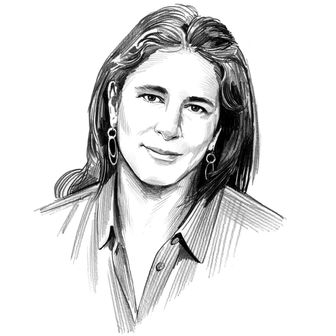
This piece originally appeared in New York’s 50th anniversary issue, My New York – a special edition that attempts to capture the city’s voice through first-person stories, spoken and written, about how our disparate lives intertwine. Read them all here.
When I was 25 years old and I interviewed for a job as a fact-checker, the boss asked me my SAT scores. Arthur Carter was a sculptor and a pioneer of the leveraged buyout; he was also the owner of the New York Observer, the salmon-colored weekly newspaper that at that point — it was 2000 — was best known for its coverage of New York real estate, media, and social gossip. It had been eight years since the test: I had been to college, waited tables and scooped ice cream, worked as the personal assistant to Harvey Keitel and as a secretary at Talk magazine; in none of these contexts had anyone spoken to me about my SAT scores. To be clear: I was not sweet Mae from the country, innocent of the connections and privileges that had landed me there. I knew, kind of. But I didn’t understand. And if I had wholly absorbed the degree to which the job I wanted him to hire me for would be to immerse myself in a hierarchy of status and fake merit, I might have run.
Very soon, I learned why it mattered in the magazine industry what table you occupied at Michael’s for lunch, or how close you were seated to the Newhouses at the Condé Nast holiday party, or who was at Elaine’s — all this futzing over places that served terrible food! I learned that for a period it was a very good thing to have your event at Lot 61, until its owner, Amy Sacco, opened Bungalow 8, at which point Lot 61 became déclassé. I learned that you wanted to list your apartment with Dolly Lenz and was taught, as I covered movie premieres, to stand and watch where the invited celebrities and movie executives sat in relation to the cast of the movie.
I didn’t write about politics back then, except as spectacle. Peter Kaplan, the paper’s legendary editor, himself had politics, cared about them very deeply, and ironically lived a quiet suburban life, eating canned tuna every day at lunch at a diner uptown, away from the status rituals he was so keen for us to map (though, in truth, his abstention was its own performance of power). But as I studied the Kremlinology of who stood where on what red carpets, I was learning not only the carpentry of journalism itself but that the power wielded within this small subset of painfully wealthy New Yorkers was built on structures, connections, access, and proximity. The same forces (if not the same specific signifiers) that social, racial, economic, and political inequality are built on and around today. I learned how to cover sexism, racism, and class bias — to see how it mattered whether you were in the room where it happened, and what the repercussions of being outside of it might be — by being forced to think about Lizzie Grubman.
I’d learn something else about power from the Observer in the years after I’d left it: that the old man who cared about his employees’ educational pedigrees but used his fortune to support a truly independent editorial enterprise was leveraging his influence in a far more original and moral way than would the young real-estate developer, Jared Kushner, who would buy the paper and try to bend it to serve his personal and political needs some years after I left, decreasing its value and its influence. Money and proximity to power, and the prestige that come with them, can get you a long distance in Manhattan. But what Carter understood, and Kushner certainly didn’t, was that trying too hard and too bluntly was to diminish their strength. Kushner’s was — to use the crude power-mapping skills I was taught to hone in my youth — a very Jersey view of power.





